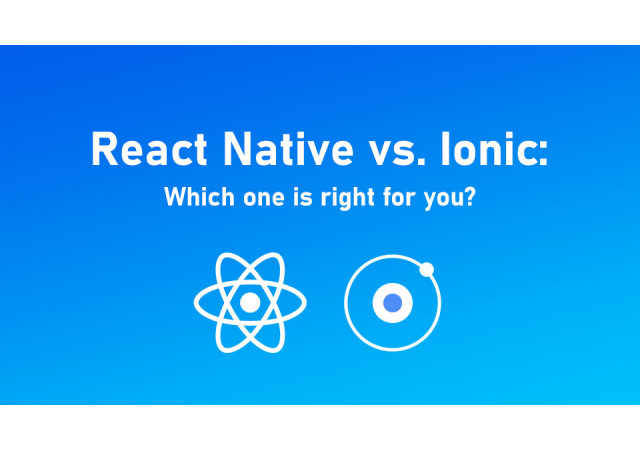Mobile app development does not imply just native iOS app development utilizing Swift or native Android app development employing Java anymore. We are in the era of hybrid, cross-platform, and progressive web apps. In this article, we can take a deeper look into the two successful mobile frameworks, React Native and Ionic. We will first see how they are alike and also investigate their diversity.
Basics
React Native is a cross-platform solution to develop mobile apps natively on both iOS and Android. It is written in JavaScript using React. It was open-sourced back in 2015 by Facebook. Thereafter it has earned tremendous popularity.
Ionic is a hybrid solution to make your mobile apps. It lets you use conventional web technologies like JavaScript, HTML, and CSS to build high-quality, cross-platform apps. Ionic Framework has published a free eBook that describes the discrepancies between a hybrid app vs. a native app.
How are they similar?
If you are just explaining about both React Native and Ionic, they clearly sound very alike to the knowledge above. Ionic lets you build mobile, desktop, and web apps using regular web technologies like JavaScript/CSS/HTML. Likewise, React Native lets you build native mobile apps using JavaScript and the famous JavaScript framework, React. This indicates you don’t need to apprehend native iOS or Android development to use Ionic or React Native.
How are they different?
Now let’s learn how these frameworks are different.
1. Native vs. hybrid
React Native is applied to raising truly native cross-platform apps. A native app is a software application developed in a special programming language, for the particular device platform, either iOS or Android. Native iOS apps are composed in Swift or Objective-C and native Android apps are written in Java. With React Native the underlying widgets are all native elements, giving the user a seamless encounter. It is built using JavaScript and React but the ingredients are all native components of iOS and Android. The advantage of React Native, is that it develops native apps, on both iOS and Android, with a single code base.
Ionic is a hybrid. It uses HTML, CSS, and JavaScript to build apps that can be worked on the web, desktop, and mobile. Hybrid apps typically use what is called a Web View to build mobile apps. The idea here is to reuse code across various platforms. So hybrid apps will not have entrance to native characteristics of the mobile device out of the box. Ionic uses Cordova plugins to combine native features to your app. Ionic contributes its graphic elements via a browser, which takes many steps to start showing the component on the screen.
2. Technology stack
React Native is written in JavaScript employing the famous framework React. The UI pieces are composed in JSX, instead of HTML. JSX looks like any other template language but happens with all of the abilities of JavaScript. The cause React Native uses React is because both the frameworks were produced and open-sourced by Facebook and it makes insight that they chose React to build React Native.
You could practice Angular, Vue, or even React to build Ionic apps. Ionic’s tech stack is a lot more resilient compared to React Native. With the freshest release of Ionic 4, you can use Ionic with either web development framework.
3. Learning curve
If you are a React developer, then studying React Native is remarkably easy. The thoughts are the same, and your code in React. The only difference is that React works with web components like <div>, <p>, whereas React Native uses components that are wrappers nearby native iOS and Android components like <View>. It shouldn’t take a long time for a React developer to convert a React Native developer.
We already saw that Ionic’s tech stack is compliant. You are going to use JavaScript, CSS, and HTML along with your preference for a web framework. It could be Angular, React, Knockout, Vue, or any other web framework that the developer prefers. This means developers who adopt the Ionic framework, are going to pick the framework that they are previously satisfactory in to develop apps.
Conclusion
Of course, there is never more than the “right” framework. Both React Native and Ionic continue with their own plus and minus, and it takes precise evaluation to pick one or the opposite for your growth. At iROHUB Infotech you will receive quality training in mobile app development courses in Kochi








Post Comments (0)